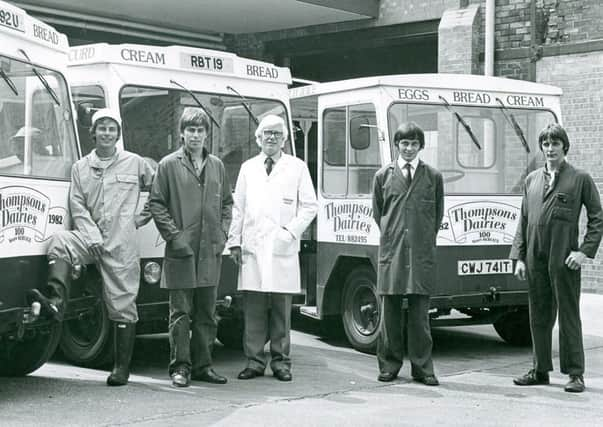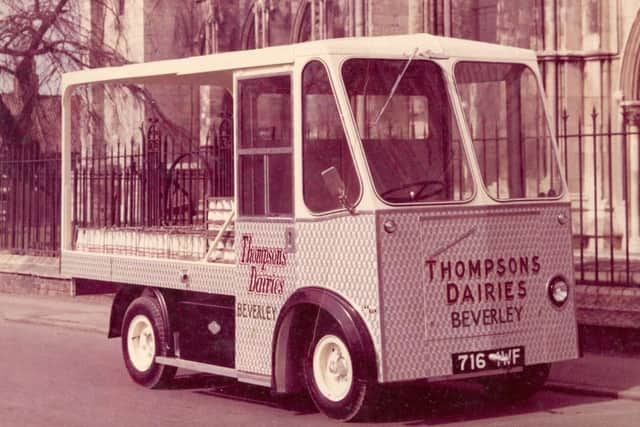Remembering when milk was king of the road


A few hardy souls strive to keep the work of the milkman alive, but deliveries of the daily pinta is virtually a thing of the past.
But memories of the days when the milkman was king of the road will live on after a Beverley dairy donated its records to local archives.
Advertisement
Hide AdAdvertisement
Hide AdFirst established in 1882 in the yard of 97 Keldgate, Beverley, Thompson Dairies grew to become the chief supplier of milk, cream and curds in Beverley and surrounding villages and was a strong competitor to Dale Farm - which it eventually sold out to a century later.


Mark Thompson, one of four brothers involved in the business, remembers parents Raymond and June going out twice a day on a horse and cart to go delivering in Beverley when he was just three: “They’d be up at 3am leaving us in bed and they’d be back at 7am.
“You had to do it twice a day in those days as milk wasn’t pasteurised then. By the time it got to tea-time it was on its way out.”
After horse and cart - the horse Kate was grazed on Hall Garth opposite the Minster - came electrical milk floats in their familiar green and cream livery.
Advertisement
Hide AdAdvertisement
Hide AdBeverley, Cottingham, Walkington and Newbald were all part of Thompson territory, which expanded to include Pocklington and villages like Everingham, when they bought Jacksons Dairy.
Back in the 80s, people still all knew each other, and levels of trust were far higher.
“In Everingham people would be out to work on the fields, doors weren’t locked and you would go into the kitchen and the money would be on top of the fridge. There would be money for the butcher, the fishmonger and the milkman, all in separate heaps. You would look in the fridge and see how much milk there was,” recalls youngest brother Quentin Thompson.
Every member of the family had their role - Raymond, a stickler for work - oversaw the milk testing, public health and customer care; Andrew was on production and packaging, Mark would organise staff, Geoffrey, office and accounts and Quentin vehicle maintenance. They had 16 rounds at Beverley, eight at Pocklington and five of school milk until Margaret Thatcher stopped it in the 1970s.
Advertisement
Hide AdAdvertisement
Hide AdHull wasn’t their traditional ground - people still liked their “steri”, sterilised milk, whereas Beverley was a firmly full fat silver-top town.
The fad for dieting led to a whole new range of skimmed milk being produced at the dairy - a reverse of the situation just a few years previously where there was no demand for milk with the cream skimmed off and it had to be fed to pigs.
Raymond retiring, new rules which required a £2m upgrade of their dairy in Figham and falling profit margins due to customers switching to supermarket milk - as well as a good offer to get out - were all factors in the decision to sell up.
Quentin Thompson said: “The customer base was disappearing rapidly; it was a change in lifestyles; people were mortgaged up and interest rates were going up, instead of the wife being at home she was going out to work. She didn’t want the bottle sat on the doorstep going sour. They wanted a supermarket for convenience and it was getting cheaper.
Advertisement
Hide AdAdvertisement
Hide Ad“We were doing four pint jugs at £1.10 - it doesn’t cost that much more to buy that now 20 years on. The dairy farmers have had a raw deal I would say.”
But everything has its cycles and Quentin sees supermarket home deliveries as being a repeat of what they tried to do years ago. “In a strange way the principle of the milkman is coming back with home delivery. People see it as more convenient. It’s a shame the milk industry didn’t see that 10 years ago and tried to capitalise on it.”